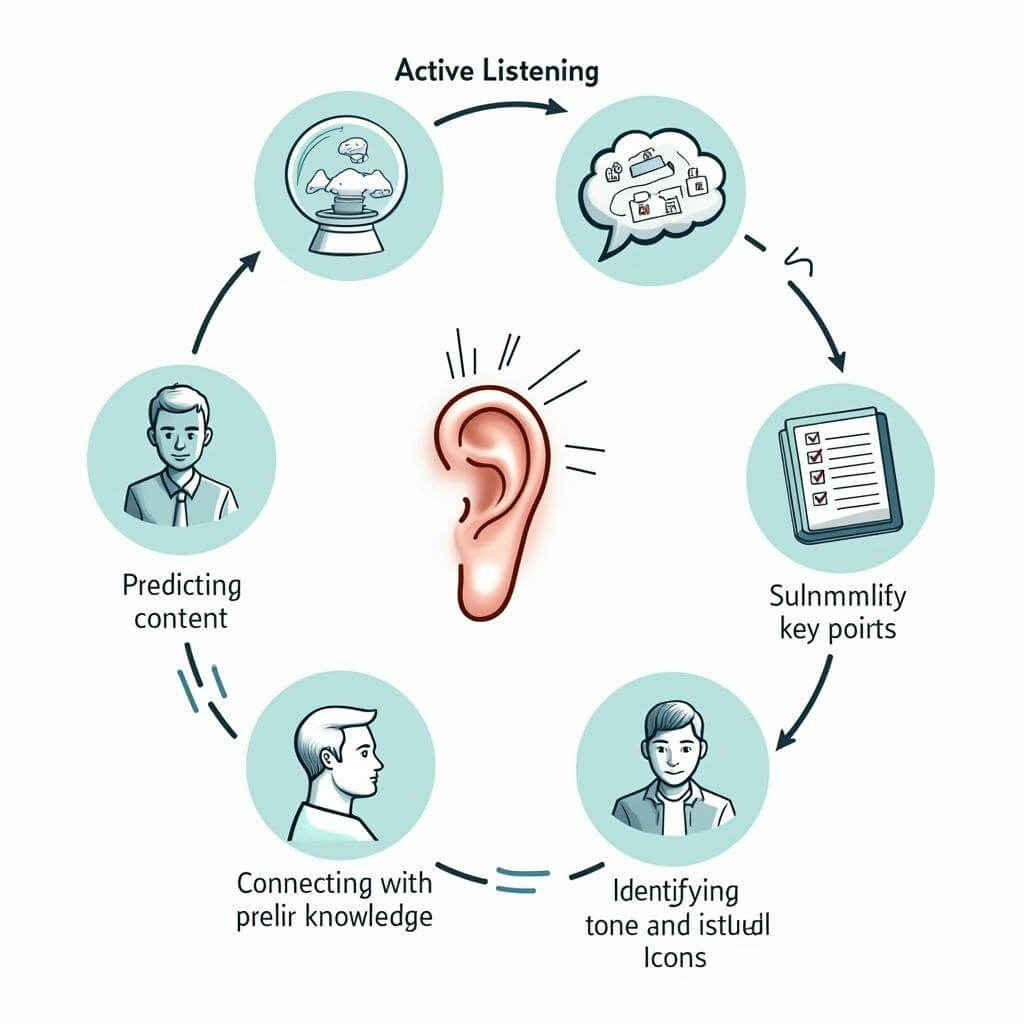The IELTS Listening test is a crucial component of the overall exam, requiring candidates to maintain focused attention throughout various audio recordings. Enhancing attention during this section is key to achieving a high score. This article will explore effective strategies to improve concentration and maximize performance in the IELTS Listening test.
Understanding the Importance of Attention in IELTS Listening
Attention plays a vital role in the IELTS Listening test, as it directly impacts a candidate’s ability to comprehend and retain information from the audio recordings. Improving short-term memory retention is closely linked to enhancing attention, as it allows test-takers to better process and recall the information they hear.
The Cognitive Aspects of Attention
Attention involves several cognitive processes, including:
- Selective attention: Focusing on relevant information while ignoring distractions
- Sustained attention: Maintaining focus over an extended period
- Divided attention: Managing multiple tasks or sources of information simultaneously
- Alternating attention: Switching focus between different tasks or stimuli
Understanding these aspects can help candidates develop targeted strategies to enhance their attention during the IELTS Listening test.
Practical Strategies to Enhance Attention
1. Active Listening Techniques
Implementing active listening techniques can significantly improve attention and comprehension:
- Predicting content based on context clues
- Visualizing the information being described
- Mentally summarizing key points
- Connecting new information to prior knowledge
- Identifying tone and attitude of speakers
These techniques engage the mind more deeply with the audio content, promoting better focus and retention.

2. Improving Physical and Mental Preparedness
Physical and mental preparation can significantly enhance attention during the test:
- Getting adequate sleep before the exam day
- Practicing relaxation techniques to reduce anxiety
- Maintaining proper posture during the test
- Staying hydrated and having a light, nutritious meal before the exam
- Arriving early to the test center to acclimate to the environment
These preparations help create an optimal state for sustained attention throughout the listening test.
3. Enhancing Concentration Through Practice
Regular practice is essential for improving attention span and concentration:
- Completing full-length IELTS Listening practice tests under timed conditions
- Gradually increasing the duration of focused listening sessions
- Practicing with a variety of accents and speech patterns
- Engaging in concentration-building exercises, such as meditation or puzzle-solving
- Listening to English language podcasts or news broadcasts for extended periods
Consistent practice helps build mental stamina and familiarizes candidates with the demands of the IELTS Listening test.
Applying Attention-Enhancing Strategies to IELTS Listening Question Types
Different question types in the IELTS Listening test require specific attention strategies:
1. Multiple Choice Questions
- Read the questions and options carefully before the audio begins
- Underline keywords in the questions and options
- Listen for synonyms or paraphrases of the options in the audio
- Eliminate incorrect options as you listen
2. Matching Tasks
- Quickly scan all items and options before the audio starts
- Group similar items or options mentally
- Listen for key descriptors or characteristics that match the items
3. Form/Note Completion
- Read the instructions carefully to understand the word limit
- Predict the type of information needed (e.g., names, numbers, dates)
- Focus on listening for specific details that fit the gaps
4. Short Answer Questions
- Identify the question words (who, what, where, when, why, how)
- Anticipate the type of information required
- Listen for exact words or synonyms related to the questions
Improving recognition of synonyms is particularly crucial for this question type, as it helps in identifying correct answers even when they’re paraphrased in the audio.
Common Mistakes and How to Avoid Them
Awareness of potential pitfalls can help candidates maintain better attention:
- Losing focus after missing an answer: Continue listening actively, as subsequent questions may not depend on the missed information.
- Getting distracted by unfamiliar words: Focus on overall context rather than individual unknown terms.
- Overthinking during pauses: Use brief pauses to quickly review upcoming questions instead of dwelling on previous ones.
- Failing to follow the speaker’s tone: Pay attention to intonation and stress, as they often indicate important information.
- Neglecting to check answers during short breaks: Utilize the time between sections to review and confirm responses.
How to improve focus during IELTS listening sections provides additional insights into maintaining concentration throughout the test.
Effective Practice Methods for Enhancing Attention
To improve attention skills for the IELTS Listening test, consider the following practice methods:
- Gradual difficulty progression: Start with easier listening materials and progressively move to more challenging content.
- Timed practice sessions: Simulate test conditions by setting strict time limits for completing practice tests.
- Distraction training: Practice in environments with mild background noise to improve focus under less-than-ideal conditions.
- Active recall exercises: After listening to a passage, practice summarizing the main points without referring to notes.
- Accent variety exposure: Listen to speakers with different accents to improve adaptability and comprehension.
Implementing these practice methods consistently can lead to significant improvements in attention and overall performance in the IELTS Listening test.
Conclusion
Enhancing attention in IELTS Listening is a critical skill that can significantly impact test performance. By understanding the cognitive aspects of attention, implementing practical strategies, and avoiding common mistakes, candidates can improve their focus and achieve better scores. Regular practice using effective methods will help build the necessary skills and confidence for success in the IELTS Listening test.
Remember, improving attention is an ongoing process that requires dedication and consistent effort. By incorporating these strategies into your IELTS preparation routine, you’ll be well-equipped to tackle the listening section with enhanced focus and precision. Avoiding common spelling mistakes is also crucial for accurate transcription of answers, complementing your improved listening skills.
We encourage you to share your experiences with these attention-enhancing techniques in the comments below. Your insights could be valuable to other IELTS candidates preparing for the test. Don’t forget to explore our other articles for more tips on acing the IELTS exam!